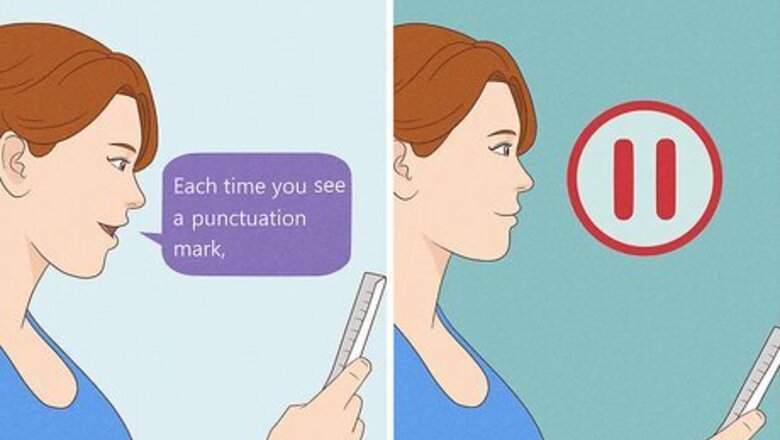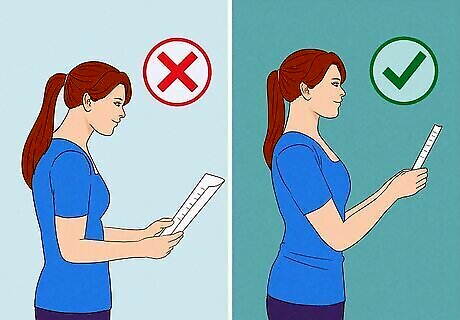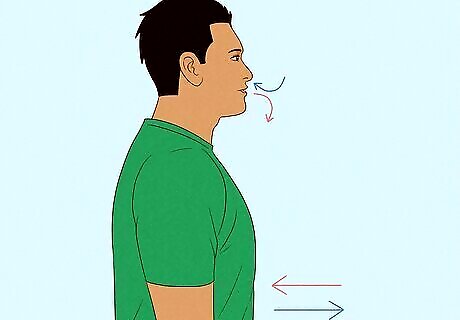
views
X
Research source
Trying Reading Strategies that Prevent Fatigue

Take short breaks while reading. Try to remind yourself frequently to take pauses after one or two sentences, and short breaks at paragraphs or dialogue. Each time you see a punctuation mark, such as a comma, give the listener a moment to mull over what has been read thus far. When you read something in your head, you can skim and rush over words and your mind gives it no second thought. However, speaking something out loud at the same pace you would read it in your head doesn't work well. Your sentences might get faster and faster until you have to stop and heave for breath. Don't let your hastiness to continue hinder your ability to speak clearly.

Speak more slowly than normal. Give the listener time to comprehend what has been said and give yourself proper intervals to keep your head from getting muddled. You may think you are speaking too slowly when really you appear to be thoughtful and intent. Try to pace yourself. If you are reading a short poem it's fine to move along at a slightly quicker pace. On the other hand, if you are reading a novel out loud, reading too quickly can easily misconstrue the action and confuse the listener. Don't overdo it or you will risk boring your audience. Speak with firmness, but with a light tone.

Take small sips of water while reading out loud. Reading aloud can dry out and fatigue your vocal chords. An easy way to help this is by taking small sips of water periodically while you are reading. Any time you start to feel like your throat is dry or you feel the need to clear your throat, take a tiny break from reading out loud just long enough to take a sip of water. Then resume your reading.

Relax your chest. Sometimes if you're concentrating too much on speaking nicely, you may suddenly find that your breathing is uneven, or your throat is sore. If you are sitting or standing with poor posture or holding your chest high, those kinds of issues may arise. Relaxing your ribcage doesn't mean you can slump your shoulders. Instead, pull them back.

Watch your breathing. Your inhalations should expand both your chest and diaphragm. This means that you should be breathing from the chest and not just from the stomach. Take care not to over-think your breathing, however, because you might breathe too much.

Practicing is always helpful. If you want to practice beforehand, try starting with a sonnet. These can cause difficulties because of the even rhythm and the rhyming. But it is a good starting point because sonnets are, as a rule, very short. So you can practice reading a sonnet out loud and begin to check the pace of your voice, the pauses you take, whether you are stiff, etc. As you get more comfortable reading something short (like a sonnet) out loud, you can gradually increase your time reading aloud by choosing longer pieces and reading out loud for longer periods. This step-up method will help you get better at reading out loud by practicing over time.
Avoiding Things That Will Lead to Vocal Fatigue

Don’t drink caffeine. Caffeine may dehydrate your throat which makes it harder for your vocal chords to perform properly. Too much caffeine intake may also contribute to losing your voice if you overuse your vocal chords. Try drinking water instead. Hydrating your throat will have a much more beneficial effect than dehydrating it with caffeine.

Avoid citric acid. Any kind of citrusy drink may annoy your throat if you are sensitive to them and make it harder for your vocal chords to perform well. This includes lemonade and orange juice. Instead, try drinking pineapple juice. It doesn’t have the citrus content that orange juice does, but it still contains the vitamin C boost you’re looking for. Pineapple juice can also be very soothing for your throat.

Don’t whisper. The act of whispering constricts your vocal chords and forces air past these constricted muscles. This causes your vocal chords to work harder and feel the extra stress of this added work, leading to more frequent vocal fatigue.

Save your voice for when you need it. Vocal rest is an important part of being able to read aloud without tiring your voice. If you have to speak or read out loud for long periods of time, you’ll also need to allow your voice to rest for long periods of time. Avoid talking unnecessarily. Don’t call your mom for a long chat right before you need to read out loud for a long period of time. Let your voice rest until you need to use it.
Practicing Vocal Exercises

Do a voice relaxation exercise. Having relaxed vocal cords will help your voice sound more pleasant to your audience and it will keep your voice from tiring for longer. This means that you will be able to speak/read out loud for a longer period of time. Try the following steps to help relax your voice: When you are in a standing position, place your hands on your throat and speak normally so that you can notice any tenseness that occurs during your regular speech. Also pay attention to any tightness in your jaw. Open your mouth wide and yawn. As you finish yawning, say out loud “ho-hum,” drawing out the last syllable of the phrase for a few seconds. Let your jaw hang as loose as it can with your mouth still closed and move your jaw from side to side while you continue humming with your lips closed. Repeat the yawning and humming. Pay attention to how your throat muscles feel. They should be more relaxed and feel less strained. Hold on to this feeling of looseness and move on with the vocal exercise by repeating the following words: “hang, harm, lane, main, lone, loom.” Exaggerate your mouth and jaw movements as you say the words. Open your mouth wide and drop your jaw as loosely as possible. If your throat feels tired, stop the exercise and yawn again. Knead the muscles in your throat with your fingers to help get rid of any residual tightness. Drop your jaw and relax your throat as you repeat the following sounds: “nah, nay, nee, no, noo.” Exaggerate the length of the sounds.

Do a vocal warmup exercise. Vocal warmup exercises are important because they help your voice and throat muscles prepare for the work they are about to do – kind of like how you would warmup your body through stretching or exercise before starting some kind of long distance marathon. Practice the following steps to help your vocal chords warm up: Take a few minutes to hum a tune. It can be a silly one like “The Wheels on the Bus” or any song of your choosing. Run your voice through some scales – like “do re mi fa so la ti do.” Imagine you are chewing gum and take your mouth and jaw through the motions. Chew slowly and softly to help loosen up your jaw muscles. Swish your tongue around inside your mouth. This can help loosen your tongue and relieve some of the tension that often builds up in the back of your tongue.

Do a breathing exercise. Breathing exercises are important for speaking because they help you strengthen the foundation of your voice – your breath. Perform the following steps to help practice better breathing: Exhale all of the air from your lungs and continue pushing the air out even after you feel like it’s totally gone. When you can’t exhale anymore, your body will automatically inhale. Breathe in deeply and notice how the air rushes in. Repeat this step three more times. Exhale normally and take a typical inhale breath, but one that does not fill up your lungs completely. Hold the air in for fifteen seconds and then exhale slowly. Repeat this exercise several times. As you continue with this exercise over a period of weeks, gradually increase your holding time from fifteen seconds to twenty, then to thirty seconds. You can even go up to 45 seconds if it is not too uncomfortable for you. While standing upright, inhale five times with short gasps through your open mouth. This will force you to use your diaphragm. Exhale in five quick puffs of air. Repeat this process, but inhale and exhale the gasps of air through your nose.




















Comments
0 comment